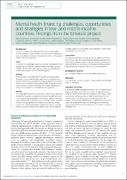Mental health financing challenges, opportunities and strategies in low- and middle-income countries: findings from the Emerald project

View/
Date
2019-08-06Author
Chisholm, Dan
Docrat, Sumaiyah
Abdulmalik, Jibril
Alem, Atalay
Gureje, Oye
Gurung, Dristy
Hanlon, Charlotte
Jordans, Mark J. D.
Kangere, Sheila
Kigozi, Fred
Mugisha, James
Muke, Shital
Olayiwola, Saheed
Shidhaye, Rahul
Thornicroft, Graham
Lund, Crick
Metadata
Show full item recordAbstract
Current coverage of mental healthcare in low- and middle-income countries is very limited, not only in terms of access to services but also in terms of financial protection of individuals in need of care and treatment.
Aims
To identify the challenges, opportunities and strategies for more equitable and sustainable mental health financing in six sub-Saharan African and South Asian countries, namely Ethiopia, India, Nepal, Nigeria, South Africa and Uganda.
Method
In the context of a mental health systems research project (Emerald), a multi-methods approach was implemented consisting of three steps: a quantitative and narrative assessment of each country's disease burden profile, health system and macro-fiscal situation; in-depth interviews with expert stakeholders; and a policy analysis of sustainable financing options.
Results
Key challenges identified for sustainable mental health financing include the low level of funding accorded to mental health services, widespread inequalities in access and poverty, although opportunities exist in the form of new political interest in mental health and ongoing reforms to national insurance schemes. Inclusion of mental health within planned or nascent national health insurance schemes was identified as a key strategy for moving towards more equitable and sustainable mental health financing in all six countries.
Conclusions
Including mental health in ongoing national health insurance reforms represent the most important strategic opportunity in the six participating countries to secure enhanced service provision and financial protection for individuals and households affected by mental disorders and psychosocial disabilities.
URI
DOI: https://doi.org/10.1192/bjo.2019.24https://kyuspace.kyu.ac.ug/xmlui/handle/20.500.12504/262
